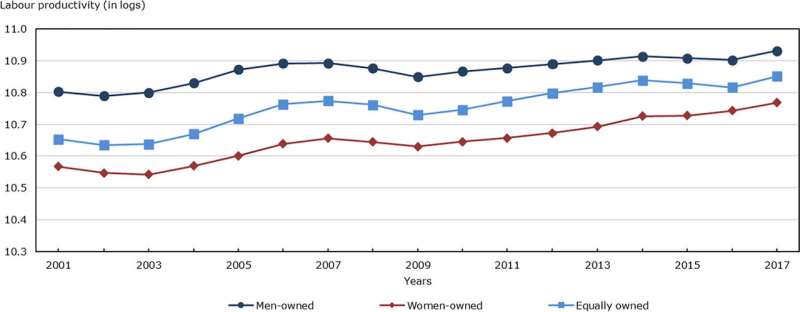Average (log) labor productivity, by year and ownership type. Credit: Small Business Economics (2022). DOI: 10.1007/s11187-022-00659-w
A new study reveals that inexperienced entrepreneurial women in Canada still see more success when partnering with experienced men than when partnering with experienced women or going it alone.
That is the key finding from research coming out of the University of Waterloo and Statistics Canada based on an analysis of 183,358 unique Canadian business ventures from 2006 to 2017 and the impact of co-ownership by women and men.
According to study co-author Dr. Horatio M. Morgan, a professor at the Conrad School of Entrepreneurship and Business at Waterloo, women-owned businesses typically underperform in terms of growth rate, profitability, survival rate, number of employees and productivity relative to businesses owned by men.
Research shows this is largely because women continue to face significant barriers, including negative gender-role stereotypes and difficulty gaining prior experience in executive positions at established companies, and challenges such as less access to financing.
Morgan emphasizes that the study does not suggest that all women need to partner with men to launch successful businesses.
He said the findings specifically apply to women without experience and that, in fact, the research shows a partnership between an experienced woman entrepreneur and an experienced man doesn't yield productivity gains.
After sifting through all the data, the researchers concluded that gender-equal ownership—inexperienced women and experienced men entrepreneurs teaming up as equal co-owners—can help women overcome the systemic barriers their new businesses face.
Morgan and his Statistics Canada colleagues, Douwere Grekou and Jenny Watt, set out to learn more about why new, inexperienced women entrepreneurs often struggle and what possible remedies might be available. The results of this research, which may not be what many people were expecting to hear, may serve to focus more resources and studies to further understand the experiences and impact of women entrepreneurs.
"It's one thing to encourage women to go into business," Morgan said, stressing the study focused on the impact of co-ownership and did not look at the role of actual mentorship. "But if it doesn't turn out to be successful, it will not be a way for them to acquire experience and get better results quickly."
The productivity gap created by gender barriers is also reduced when inexperienced women partner with experienced women entrepreneurs, but analysis showed the gains are substantially lower and less enduring than if they partner with experienced men entrepreneurs, who typically have a broader base of knowledge and stronger connections in men-dominated networks.
The implications of the study are two-fold. First, Morgan said the findings could help women close the gap in business sectors that are dominated by men, increasing gender equality in the economy.
Second, Morgan said fostering more successful women entrepreneurs in Canada will benefit the entire country. Tapping into the energy and talent of half the population in new ways could boost productivity and raise living standards across the nation.
The study appears in Small Business Economics: An Entrepreneurship Journal.
More information: Douwere Grekou et al, Gender productivity gap: does gender-equal ownership compensate for female entrepreneurs' lack of prior industry experience?, Small Business Economics: An Entrepreneurship Journal (2022). DOI: 10.1007/s11187-022-00659-w
Provided by University of Waterloo
























